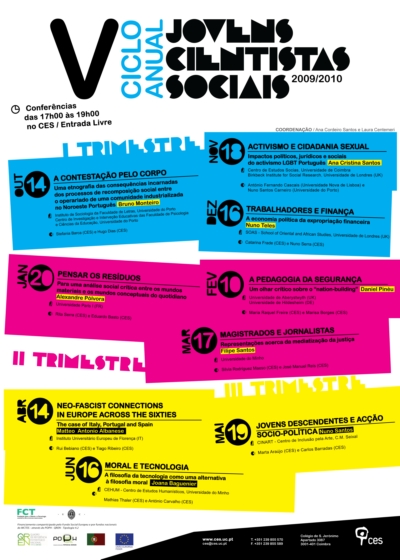V Annual Cycle Young Social Scientists
2009-2010
October 14th, 2009 , 17:00, CES Seminar Room
Bruno Monteiro (Institute of Sociology, School of Arts and Humanities and the Centre for Research and Educative Intervention of the School of Psychology and Education Sciences, University of Porto)
Contestation trough the body. An ethnography of consequences incarnated from the processes of social recomposition between the working class of an industrialised community of the Portuguese Northwest.
Abstract: This communication seeks to understand the consequences incarnated through the processes of social recomposition of an industrialised community of the Portuguese Northwest and explain the immediate «subjective» effects («psychological and physiological») parting from objective inflections in the social trajectory.
The sociological ethnography carried out in the course of 2007 and 2008, involving participant observation (stressing the experience as a machine operator in a furniture factory during 14 weeks and residing during 5 months in a community, where it was possible to participate in the activities of an amateur football club and to attend the various loci of relational condensation of the workers) and the execution of semi-structured in-depth interviews to 35 workers of the furniture industry (with a 60 to 300 minute span each), sought to, while sociological thinking mode in action, implement a research strategy theoretically guided as «back to the rough ground) (Wittgenstein) that seems especially adequate regarding the study of «silent» and «natural» repercussions of the local social structuring of space.
«Being discouraged» and «unmotivated» seem to configure somatised aspects of conditioned realities and defilation experiences lived in working class sociability spaces («bad atmosphere», «disrespect», «worries»). The relation of «distrust» concerning the world, the future and others, the insomnias and nightmares motivated by «concerns» , the sensation of constant fatigue, the «nervous problems», the experience of spatial and body oppression («suffocation», «pressure», «choke») seem to constitute modes of tacit expression of somatic experiences culturally mediated by «[economic] nervous system». «Heartburn» and «burning stomach», «hothead» e «burning up», sensations that tend to be associated to experiences of «shame» and «disturbance», reveal an incarnation of class just as it is daily (re)constituted in the frameworks of organization of interaction. These body metaphors allow the articulation and clarification of experiences that, otherwise, would remain inarticulate, repressed and censured by the local system of power or would end deviated into forms of expression socially prescribed and acknowledged. These examples, which fall from the working class practices and discourses, generally intermittent and fragmentary, are a kind of visceral evocation that «embodies», figuratively and literally, the attempts to attribute coherence to social transformations.
Biographic note: Holds a Doctoral Degree in Sociology at the University of Porto. Researcher at the Institute of Sociology (School of Arts and Humanities of the University of Porto) and at the Centre for Research and Educative Intervention (School of Psychology and Education Sciences, University of Porto). Member of the European network SCUD – Network for the Studies of Cultural Distinctions and Social Differentiation – and the coordinating committee of the Centre for Documentation and Information of the Working class Movement of the Popular University of Porto.
